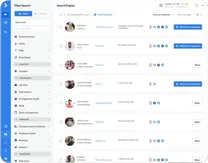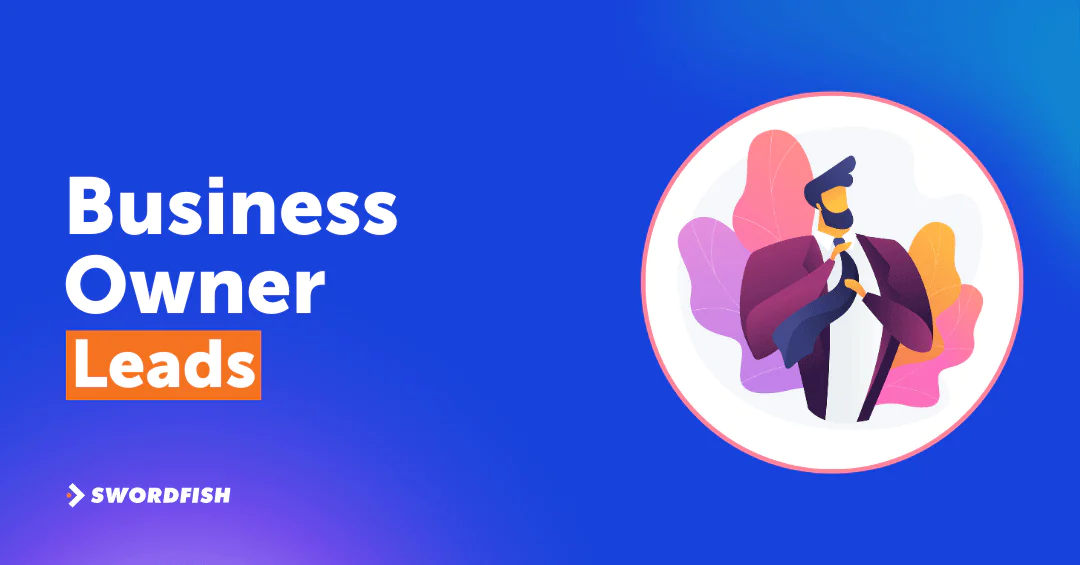
If you want to grow your small business, you must connect with the right people. Specifically, you need to find business owners who make decisions because they can open doors to new opportunities and partnerships that can skyrocket your business.
So, how can you find the business owner leads?
To find key business contacts, try using Swordfish AI. It’s built to help you spot and connect with business owners. But don’t just rely on this tool alone; make sure to network as well. Get involved both online and offline—use social media wisely, join relevant groups, and take part in discussions.
In the next sections, we’ll go into more detail about understanding the importance of business owner leads, share practical tips on generating them effectively, and discuss strategies to make those connections count.
Ready to get started? Let’s jump right in.
What are Business Owner Leads?
Business owner leads are specific details about individuals or entities who own businesses. They can be interested in purchasing products or services that can help in their business operations.
Moreover, these leads include contact information such as names, phone numbers, and email addresses. The main purpose of gathering business owner leads is to target potential customers more effectively. It helps companies offer relevant products or services directly to business owners.
Therefore, these leads are needed for marketing and sales strategies. They perfectly enable direct communication with decision-makers who have the authority to make purchasing decisions.
Types of Business Owner Leads
Understanding the different types of business owner leads is necessary for effectively forming sales and marketing strategies. Here are the main categories of leads as they appear in a business setting:
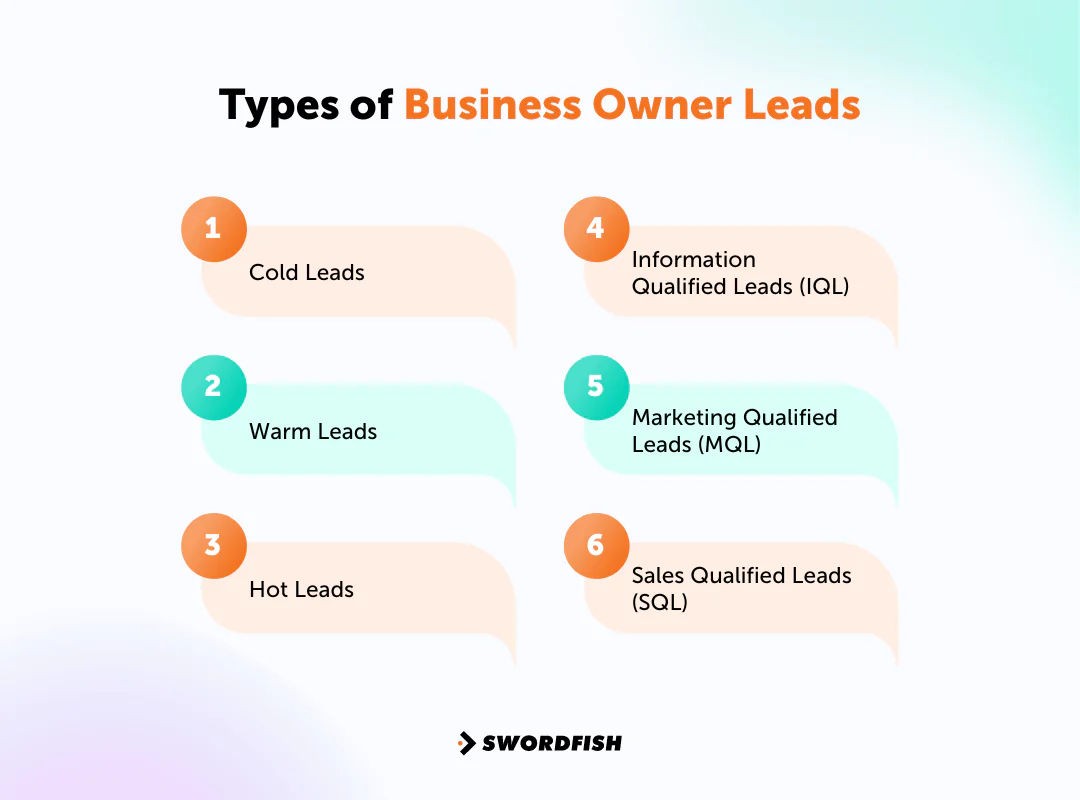
Cold Leads
Cold leads are individuals or companies that have not previously interacted with your brand. They might have encountered your company through general marketing efforts or lists but have not engaged actively.
The leads often require more effort and strategic outreach to warm them up and convert them into interested prospects.
Warm Leads
Warm leads have shown some level of interest in your products or services. This interest could be demonstrated through actions like visiting your website, engaging on social media, or responding to initial marketing campaigns.
Also, they are more familiar with your brand than cold leads and are generally more receptive to sales lead.
Hot Leads
Hot leads exhibit a strong interest in your company’s offerings and are often close to making a purchase decision. They might have directly reached out to inquire more about a product, requested a demo, or discussed pricing.
These leads are the most likely to convert quickly and require immediate and personalized attention.
Information Qualified Leads (IQL)
These are leads who engage with your content to gain knowledge but may not necessarily have an immediate need or interest in purchasing. Typical interactions include downloading whitepapers or subscribing to newsletters.
So, nurturing these leads involves educating them further about your products and moving them along the sales funnel.
Marketing Qualified Leads (MQL)
MQLs are leads that have shown a higher degree of interest and engagement, potentially indicating readiness to explore further or make a purchase.
Well, actions like frequent site visits, repeated content downloads, or attending webinars can classify leads as MQLs. This approach signals they are ripe for more direct sales follow-up.
Sales Qualified Leads (SQL)
SQLs are leads that have been reviewed and vetted by the sales team and are considered ready for a direct sales approach. The category includes leads that have passed certain thresholds of engagement, intent, and likelihood to purchase.
It’s basically based on specific criteria set by the sales and marketing teams.
How Business Owner Leads Work
The leads of new business owners work by giving you the contact details of people who own businesses. The information includes their names, phone numbers, and business owner email addresses.
When you have it, you can contact them directly. You can send emails, and make phone calls to give them information about what you’re selling. The goal is to talk to them about how your product or service can help their business.
If they’re interested, they might buy from you or learn more about it. The process helps you find potential customers who are more likely to be interested in what you offer.
Examples of Business Owner Leads
The business owner leads are potential contacts who have shown an interest in a company’s products or services and are considered likely to become customers. Here are three examples of such leads:
John, a Marketing Manager
Example: “John has shown interest in improving his marketing strategies by downloading a free e-book on content marketing from a company’s website.”
To engage John further, the company could send him an automated email expressing gratitude for his interest and inquiring about his current marketing challenges.
They could also offer him additional resources like webinars or case studies. This might help him tackle his marketing problems and learn more about the company’s offerings.
Sarah, a Small-Business Owner
Example: “Sarah is actively exploring solutions to enhance her business operations and has signed up for a free trial of a new product, requesting a demo. “
Well, this one indicates her proactive engagement and readiness to explore products that could benefit her business. The company can nurture this lead by sending personalized emails formed to her business needs, gathered during her sign-up process.
They can also provide exclusive content that addresses her specific challenges.
Mike, an SEO Expert
Example: “Mike completed a survey on a business’s website, showing a vested interest in the company’s offerings.”
Here, at the survey’s completion, he was directed to a thank-you page where he could be invited to subscribe to the company’s newsletter. The subscription could promise regular updates on industry trends and special offers. It also can further engage him and potentially move him closer to a purchase decision.
What is the Lead Generation Process?
Lead generation is important for attracting prospects to your business and nurturing their interest to convert them into customers. Here are some effective strategies for lead generation:
- First, the visitor discovers your business through one of your marketing channels, such as your website, blog, or social media platform.
- Then, that visitor clicks on a call-to-action (CTA), which is an image, button, or message that encourages website visitors to take some sort of action.
- Now, the CTA takes the visitor to a landing page, which is a web page designed specifically to capture lead information in exchange for an offer.
- Once on the landing page, the visitor fills out a form in exchange for the offer, thus becoming a new lead.
How to Generate Business Owner Leads Effectively
To generate business owner leads effectively, you need strategies that connect with your target audience. By offering value and building relationships, you can attract business owners who might be interested in what you offer.
Here are 7 methods to generate business owner leads:
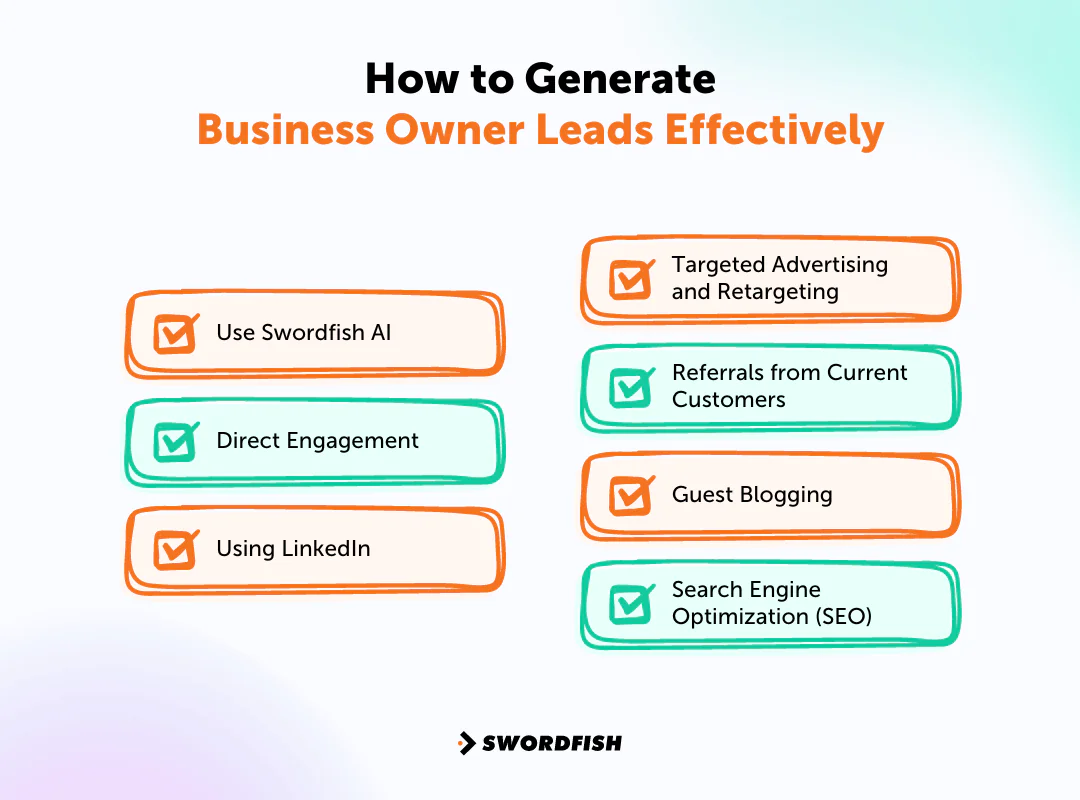
1. Use Swordfish AI for Better Business Owner Leads
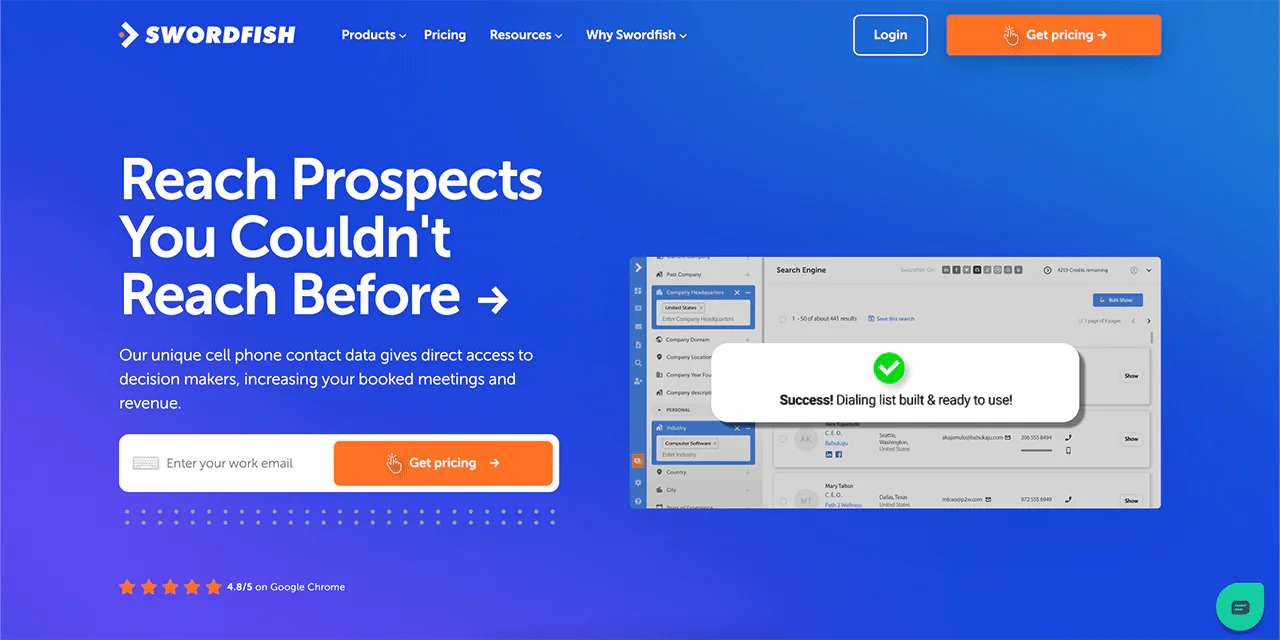
Swordfish AI is an excellent tool for businesses focusing on lead generation. It provides access to over 3.5 billion profiles with verified contact information.
Also, the platform excels in supplying accurate cell phone numbers and business emails, enhancing direct communication with decision-makers. Its real-time validation of line connectivity ensures the reliability of data. This approach makes it a trusted resource for creating targeted calling and email lists.
With features like a Chrome extension and API integration, Swordfish AI simplifies the process of populating CRM systems and improving outreach efforts. It’s necessary for industries where direct contact with individuals can influence lead conversion rates.
Key Features of Swordfish AI
Here are the key features of Swordfish AI and how they can help you generate business owner leads:
Chrome Extension
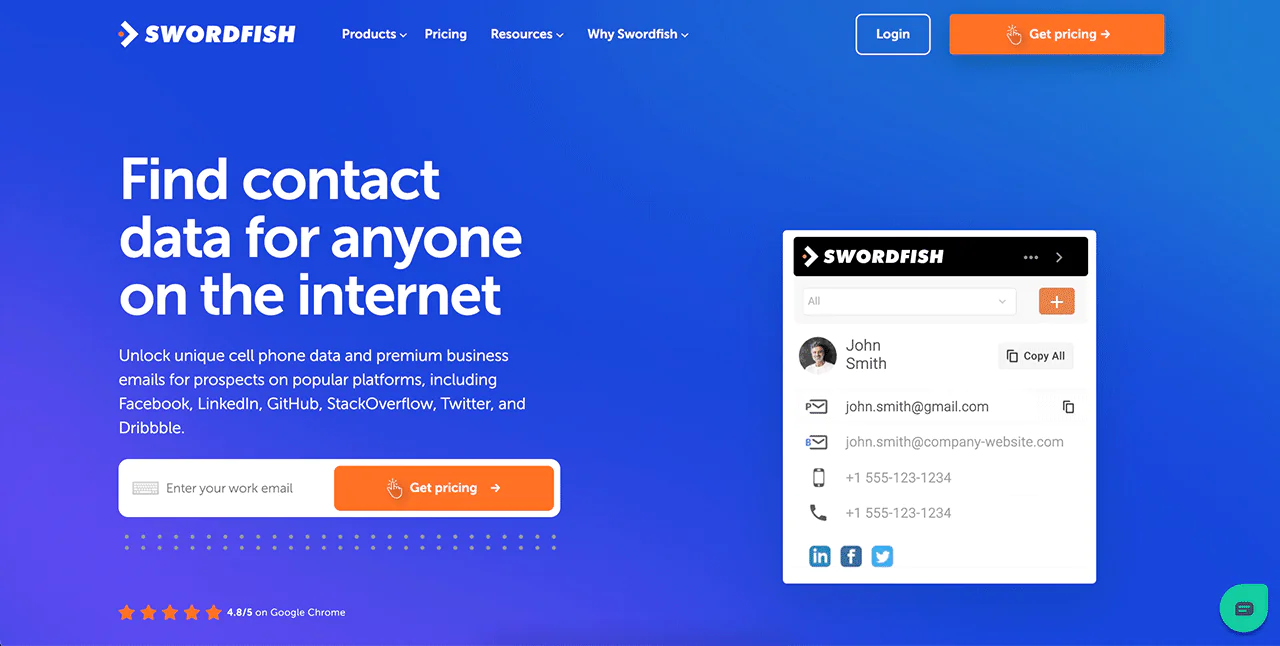
Swordfish AI’s Chrome Extension allows you to instantly find contact information for anyone online across platforms like LinkedIn, Twitter, and Facebook. It’s great for directly reaching business owners by providing their verified contact details in seconds.
Prospector
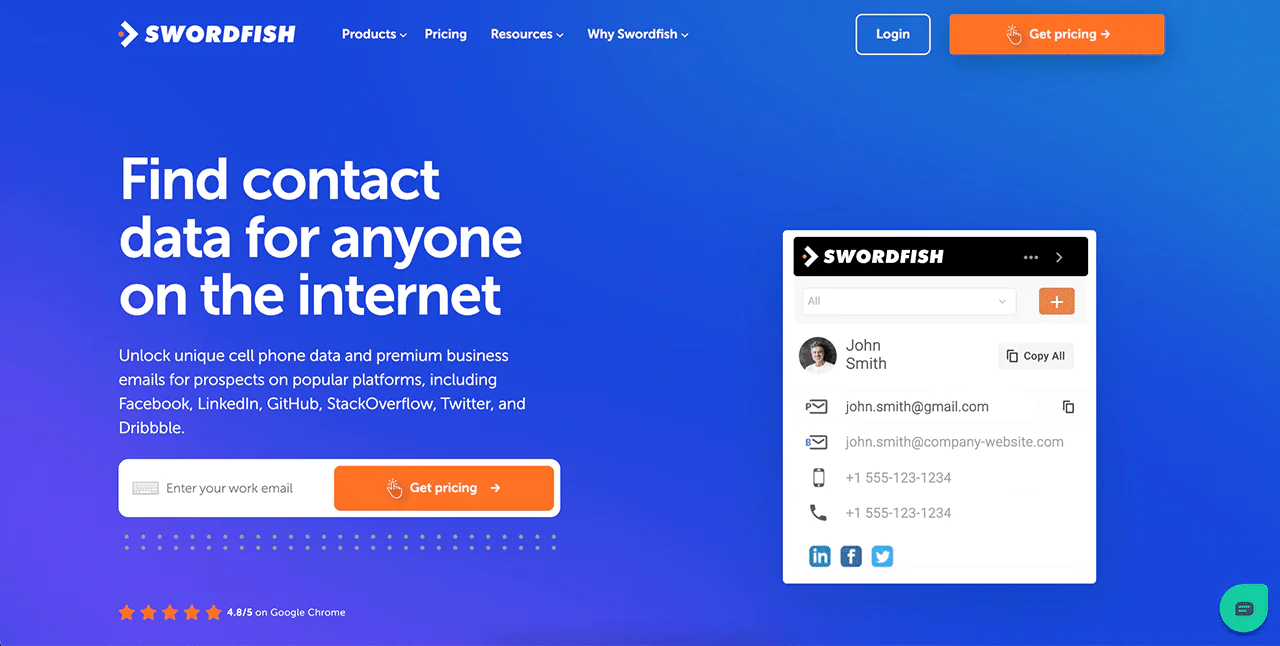
The feature helps you to create targeted lists for calling or emailing quickly using advanced filters. It’s perfect for generating leads in bulk, ensuring your sales team can focus on reaching out to business owners with precision. Also, it enriches productivity and lead quality.
File Upload
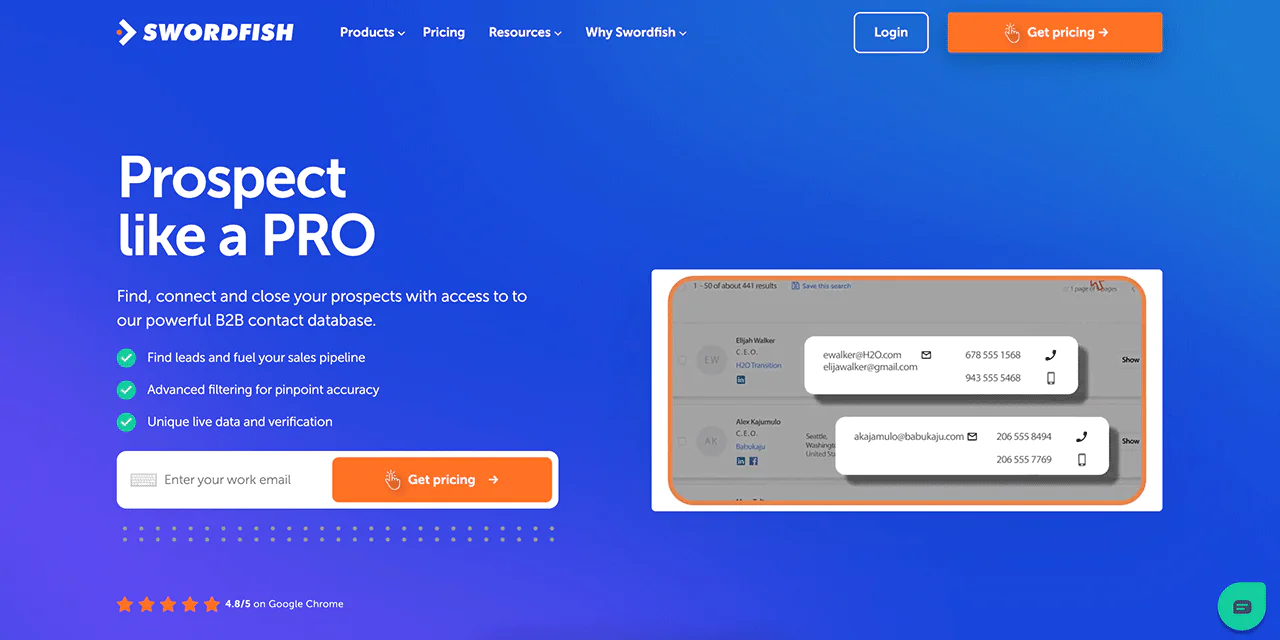
Swordfish AI lets you upload a CSV file and fill in missing contact information, such as cell phone numbers and emails. It’s necessary to enrich your CRM business owner database and make it easier to connect with business owners whose contact details might be incomplete.
Reverse Search
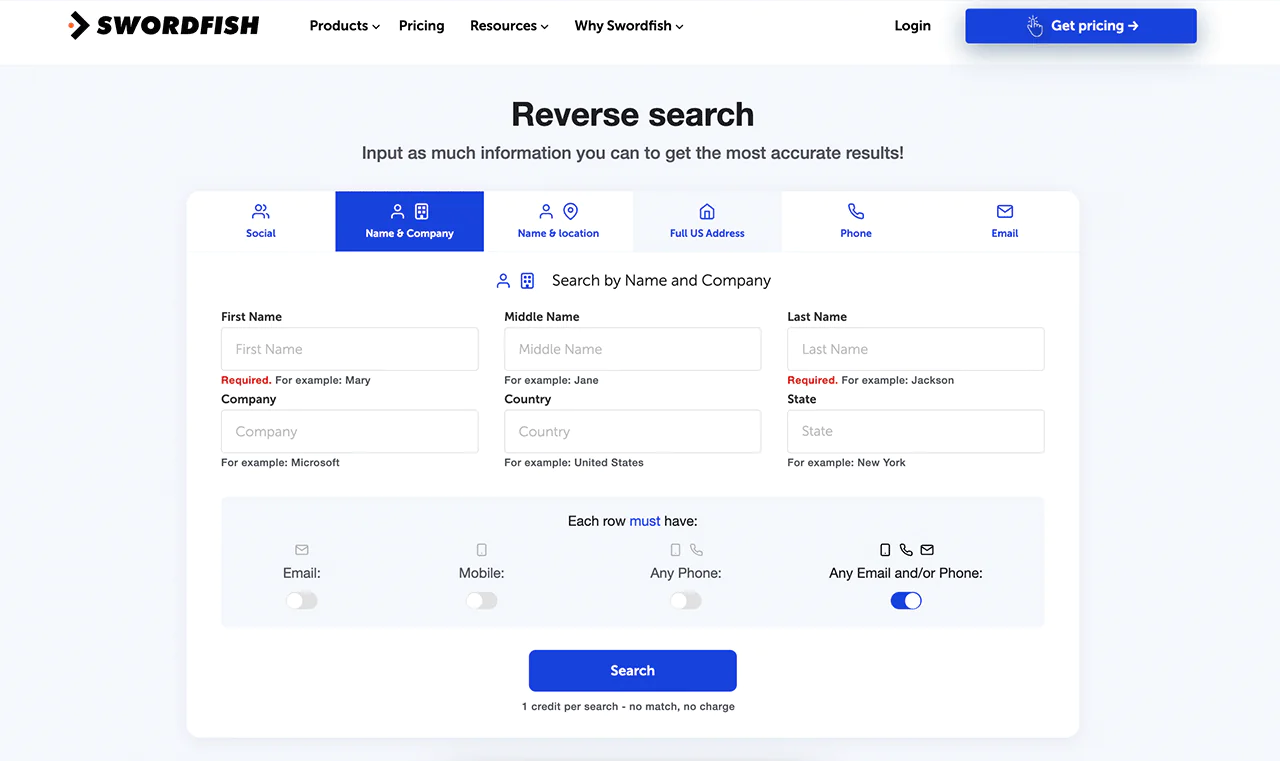
With the Reverse Search capability, you can use known details to find a business owner mailing lead lists. Whether you have a name, company, or just a social profile, Swordfish AI can find the person, making it easier to expand your network of business owner leads.
API Integration
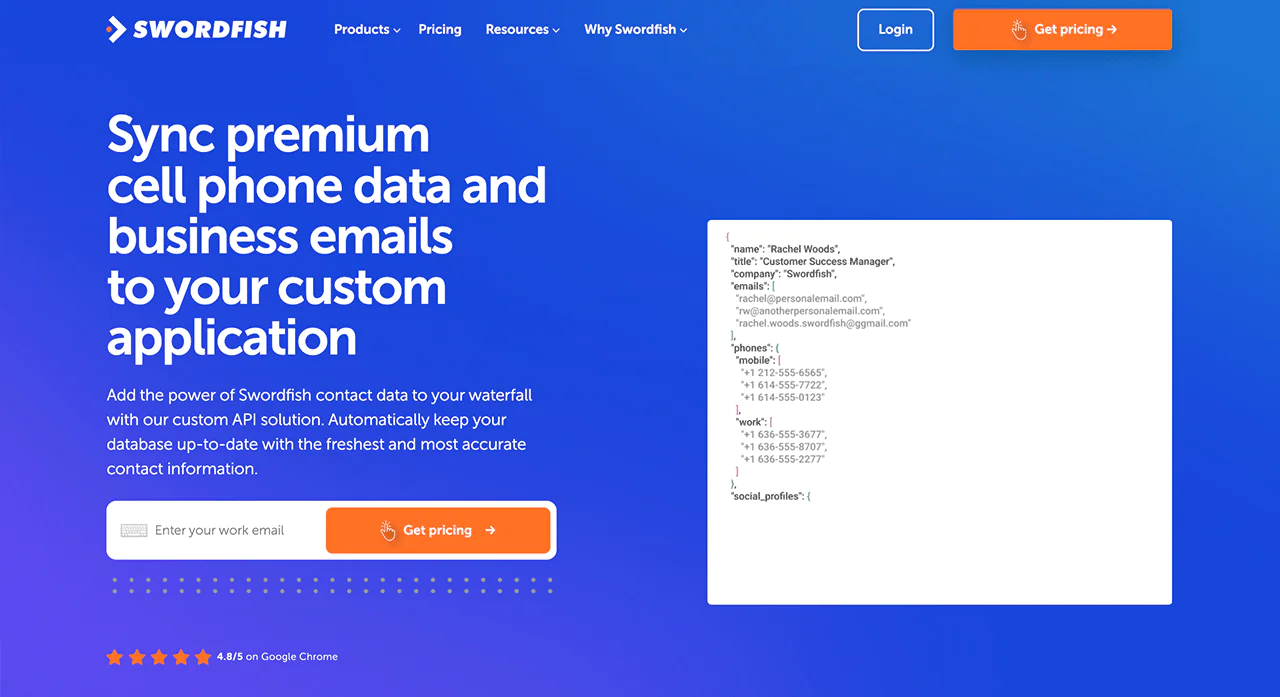
Swordfish AI offers API integration, allowing you to add unique Swordfish data directly into your applications. The feature supports large-scale operations by automating the process of gathering business owner contact information. It saves time and resources.
Bombora® Intent Data
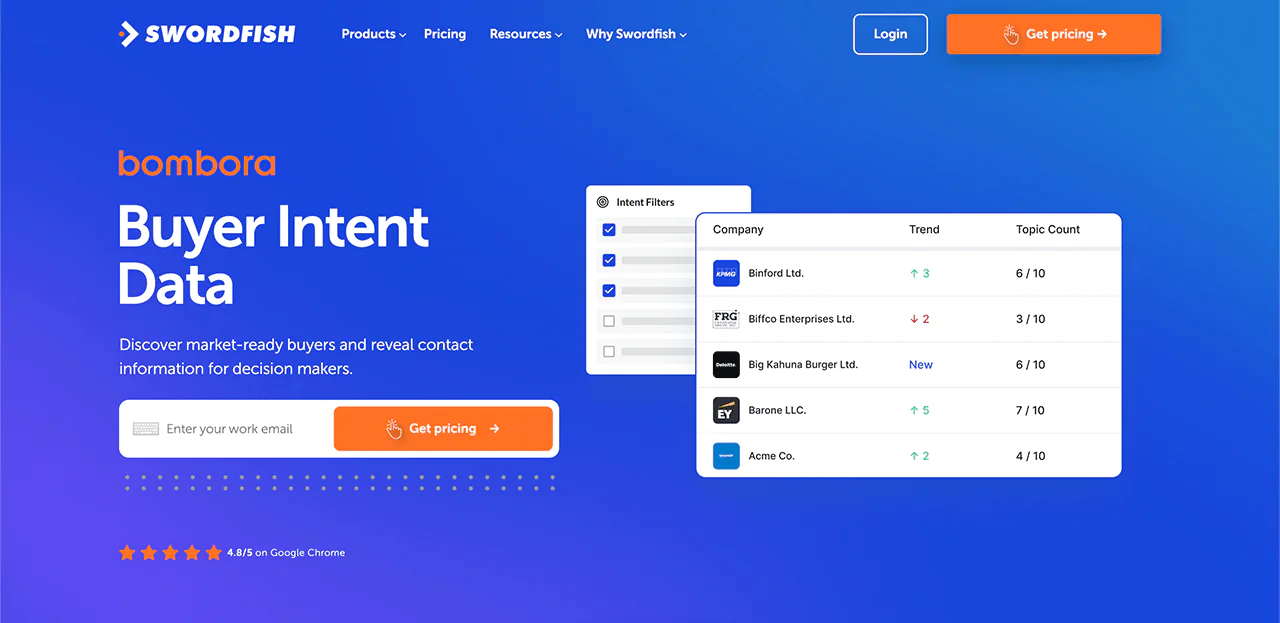
By integrating buyer intent data from Bombora, Swordfish AI helps you identify businesses that are ready to buy your product. It’s a game-changer for targeting business owners who are already in the market for services or products like yours. Plus, this increases conversion rates as well.
Try Swordfish Ai
2. Direct Engagement
Reach out to potential clients directly through social media, email, phone, or in person. The approach is especially effective for high-value products or services.
For instance, if you run a lawn care company and notice a large commercial property being developed, contacting the property manager directly could secure a new client.
This hands-on method builds personal connections and can increase b2b lead conversion rates.
3. Using LinkedIn
LinkedIn is excellent for B2B marketing due to its audience of professionals with twice the buying power of the average web user.
Start by connecting with industry leaders and actively engaging with posts related to your services. Additionally, you can take advantage of LinkedIn’s advertising features, such as lead gen ads that include integrated forms. This makes it easier for potential clients to show interest in your offerings.
Remember, consistently interacting and adding value to your conversations can turn your connections into effective leads.
4. Targeted Advertising and Retargeting
Use platforms like Google Ads for targeted pay-per-click advertising to reach people who are actively looking for products or services similar to what you offer.
For example, if you own a car dealership, you can create ads targeting keywords related to your location and the types of cars you sell, which can help attract local customers.
Also, try using retargeting ads to stay in front of visitors who came to your website but didn’t make a purchase. It keeps your brand in their view and increases the chances they’ll consider you on their next visit.
5. Referrals from Current Customers
Encouraging happy customers to recommend your business to others is a powerful way to generate leads. Satisfied clients can become testimonials, sharing their positive experiences and attracting new leads.
To motivate them, consider offering rewards such as discounts for each new client they refer. This strategy leverages the trust they have within their networks to bring in potential clients.
This method not only generates high-quality leads with minimal effort from you but also strengthens the impact of word-of-mouth promotion.
6. Guest Blogging
Writing guest posts for relevant sites in your industry can improve your SEO and bring in referral traffic. The strategy not only positions you as an authority in your field but also exposes your brand to new audiences.
By selecting sites that complement rather than compete with your offerings, you can attract leads interested in your services.
Moreover, local SEO benefits when you contribute to local influencers. It expands your visibility in specific regions which is amazing.
7. Search Engine Optimization (SEO)
Last but not least, improving your business’s visibility in search results through SEO is very important.
You can start with keyword research to find what prospects are looking for and design your website’s content to match. In highly competitive sectors, teaming up with an SEO firm can improve your online presence, too.
This process, while an investment, pays off by continuously attracting leads. As potential customers discover your business organically, you’ll notice a consistent increase in interest.
Also, it makes SEO an essential strategy for lead generation and business growth.
Who Needs Business Owner Leads?
Many people and businesses benefit greatly from having business sales leads. Here’s who needs them most:
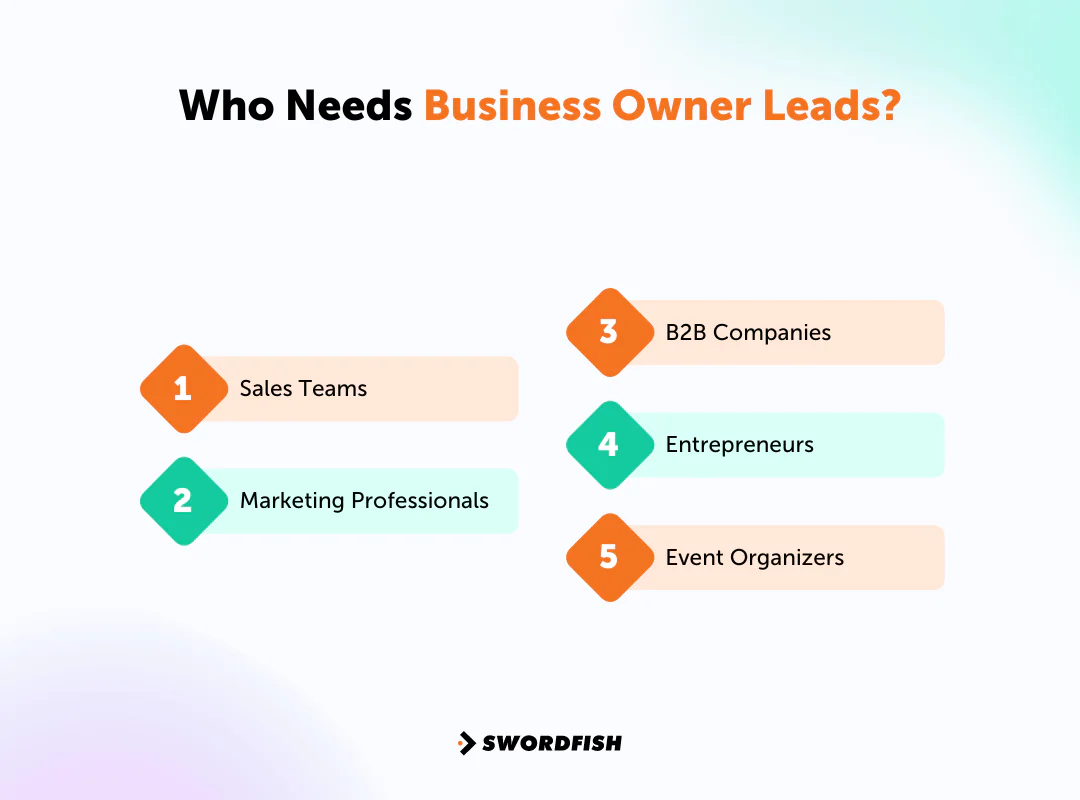
Sales Teams
B2b sales professionals use leads to directly contact business owners. It helps them pitch their products or services more effectively and close deals faster. This enhances their sales and maximizes the outreach properly as well.
Marketing Professionals
These experts target their advertising and promotional efforts better with leads. It forms messages that are more likely to catch a business owner’s attention and prompt action.
B2B Companies
For businesses that sell products or services to other businesses, leads are necessary. They provide a direct line to potential clients, making it easier to establish valuable partnerships.
Entrepreneurs
Entrepreneurs looking for advice, mentorship, or investment opportunities can benefit from connecting with experienced business owners. This opens doors to invaluable guidance and potential funding sources.
Event Organizers
Those organizing business conferences, trade shows, or networking events need leads to invite business owners. It ensures the event is attended by decision-makers and influencers.
What Makes a Great Business Owner Lead?
Identifying and understanding what makes a great business owner lead is essential for optimizing the sales process and achieving successful outcomes.
Here are several factors that contribute to the quality of a business owner lead:
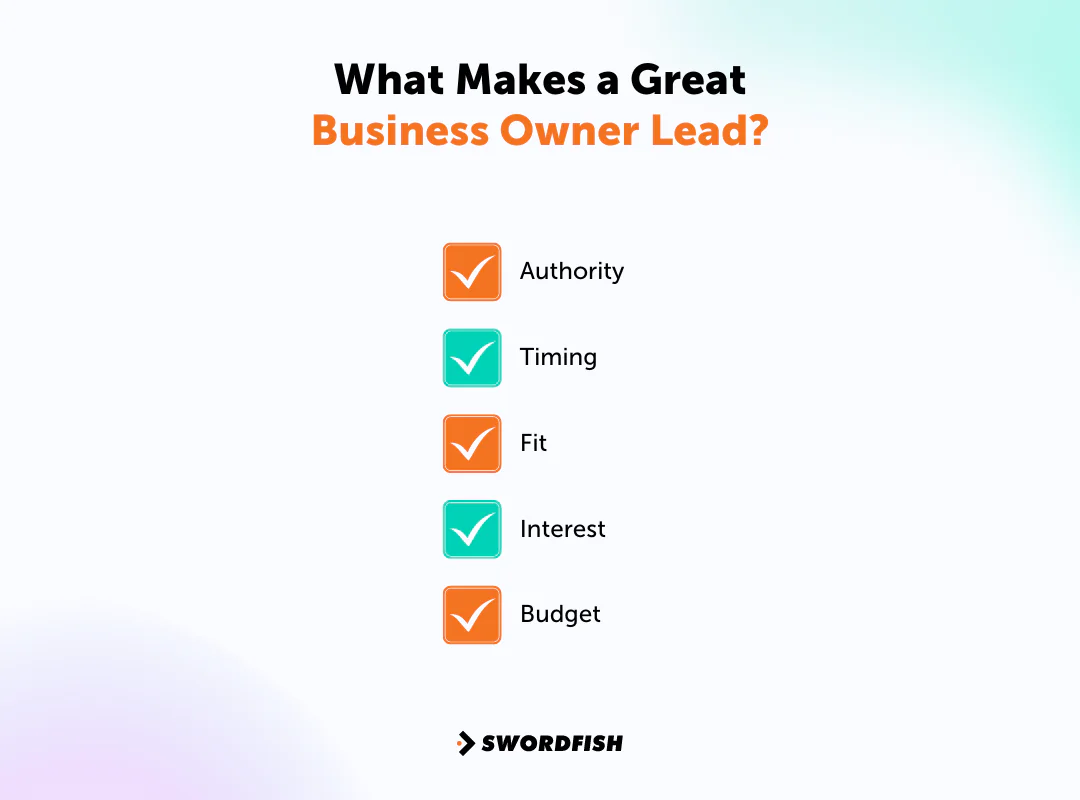
Authority
The best leads are those who have the power to make purchasing decisions. This can include senior managers, executives, or other key decision-makers within a company.
Thus, engaging with decision-makers directly can shorten the sales cycle and increase the likelihood of a successful sale.
Timing
Timing is critical in lead qualification. A lead who is ready to make a purchase decision or has a defined timeframe for implementation is more valuable. Such leads are considered ‘hot’ and should be given immediate attention to capitalize on their readiness to act.
Fit
A high-quality lead perfectly aligns with the company’s ideal customer profile. This means the prospect should match specific demographics, such as industry type, job title, and company size.
So, the more a lead’s attributes align with these criteria, the higher the chances of a successful engagement and eventual sale.
Interest
Leads who have demonstrated a genuine interest in your product or service are more likely to convert into customers. Interest can be shown through actions such as visiting your website multiple times, downloading content, or attending informational webinars.
Hence, engaging with these leads should be prioritized as they have already shown a connection to your offerings.
Budget
It’s crucial that the lead has the financial capability to purchase your product or service.
Targeting leads that can afford your offerings not only increases the efficiency of the sales process but also ensures that time and resources are invested in the most promising prospects.
Conclusion
In conclusion, generating business owner leads is necessary if you want to grow your business and expand your market reach.
To connect with decision-makers, use platforms like Swordfish AI for contact info, target ads to specific audiences, write guest blogs, and optimize your website for search engines.
However, avoid outdated data, generic lists, and sources without clear information on how the leads were collected to ensure compliance and effectiveness.
Remember, the quality of your leads is just as important as the quantity. So, take the time to refine these strategies, and watch as your business grows through improved connections with business owners.
FAQs
Why are business owner leads important?
They’re important because they let you reach decision-makers directly, increasing the chance of making a sale or forming a partnership. Direct contact with a business owner can speed up business processes too.
If I buy leads of business owners, will it work effectively?
Yes, purchased leads will work effectively if they are high-quality and relevant to your business. However, building your list through direct engagement and marketing can often increase more personalized and responsive leads.
Can social media help generate business owner leads?
Yes, social media can help generate business owner leads. In platforms like Swordfish AI and LinkedIn, you can connect with business owners directly, join industry-specific groups, and use targeted ads to reach your ideal customer profile.

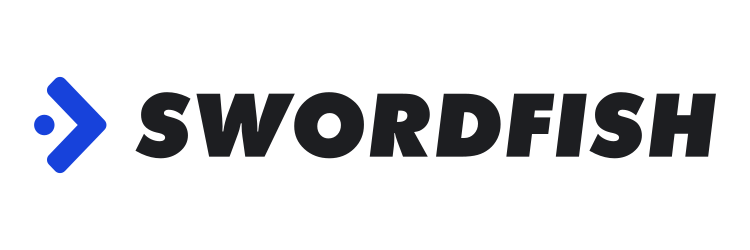
 View Products
View Products


